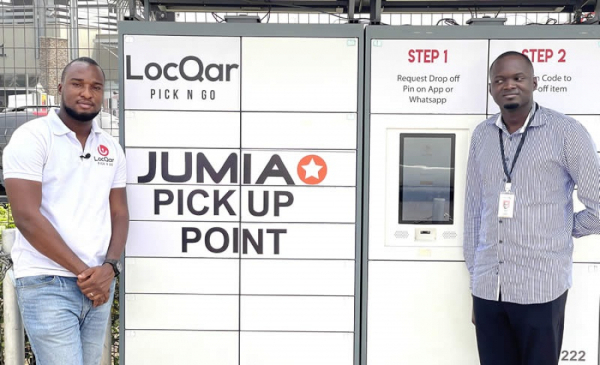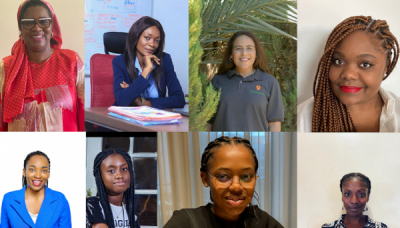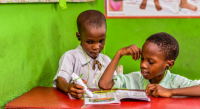The e-commerce sector has experienced a recent boom in Africa with the emergence of new solutions. To stand out from the growing competition, Jumia Ghana has adopted a strategic technological plan.
The Ghanaian dealer of Jumia, an e-commerce company present in a dozen African countries, unveiled today its partnership with the local smart locker company LocQar. Jumia wants to provide secure lockers to its customers in Accra, where they can easily take possession of their online orders.
“The experience of our customers is very important to us and that is why we have established this partnership with LocQar. It takes only 7 seconds from when customers arrive at the smart locker to when they pick up their orders. Also, it is highly convenient because these lockers are available 24 hours a day, 7 days a week. This makes it possible for customers to pick up at any time of the day to retrieve their parcels,” said Samuel Esiri, Country Manager of Jumia Services Ghana.
LocQar provides smart lockers in strategic locations such as Kotoka Airport, Accra Mall, and West Hills Mall. These lockers are managed by a digital platform and once a parcel is dropped off, the recipient is immediately notified (via SMS or email). They automatically receive an access code and only need to enter it on the locker controller's touch screen to access their package.
LocQar's smart lockers are secure and safe and are equipped with alarms. They are located in areas under video surveillance and accessible 24/7.
Adoni Conrad Quenum
Casava, which offers a 100% digital insurance service, has secured pre-seed funding of $4 million to support its business expansion. The company is touted as the first-ever to offer 100% digital insurance services in Nigeria.
“Our mission is to provide affordable insurance for Nigerians and other Africans and we are happy to have raised these funds from an exciting group of investors,” said Bode Pedro (pictured), founder and CEO of the company.
These funds are the first the company has received since its founding in 2016. Casava is taking advantage of the expense savings offered by the digital, allowing potential or confirmed customers to purchase work or health insurance premiums online. “The Casava team has developed a unique and disruptive product that we believe has the potential to transform Africa’s insurance market,” said Avi Eyal, General Partner at Entrée Capital, one of the venture capital firms that contributed to the fundraising.
In the risk coverage segments in which Casava operates, there is an opportunity in terms of digitization of services, as many workers are often underemployed, with no protection against the risks of business interruption and thus technical unemployment, and the risks of illness. According to the Nigerian National Bureau of Statistics, 20% of workers have lost their jobs due to Covid-19 and many of them in small trades have not received compensation.
The digitalization of insurance services in Nigeria has been growing in recent years. The potential size of the market in terms of subscribers (95% of the 33% of social network subscribers) is an opportunity, but technological solutions will have to go beyond technical issues and address substantive challenges such as the lack of trust between insurers and policyholders, ease of premium payments, but also reimbursements in case of claims. These are all issues that will need to be monitored.
Barely two years after launching, Amitruck already has over 8,000 vehicles registered in its database, completed 100,000 deliveries, for more than 300 corporate clients.
Amitruck is a digital trucking logistics service launched in 2019 by the eponymous Kenyan startup. On February 2, 2022, the firm raised $4 million in seed funding. Led by Better Tomorrow Ventures (BTV), with participation from Dynamo Ventures, Rackhouse Venture Capital, Flexport Inc, Knuru Capital, Launch Africa Ventures, Uncovered Fund, and strategic angel investors, the round will allow Amitruck to speed up its expansion in Africa and hire new talent.
Founded by Mark Mwangi (picture), Amitruck connects businesses and individuals, who need to move their goods, with truck owners and logistics companies. Mwangi came up with the idea after realizing that the informal logistics sector, which uses archaic manual systems, was fragmenting and unnecessarily increasing operating costs.
By integrating new technologies in transit operations, the Kenyan founder aimed to modernize and make the sector safer in Kenya. Plus, the service dealt with the issue of middlemen who raise costs of services, enabling customers to deal directly with the selected carrier. All drivers and vehicles are checked, and goods in transit are insured against loss and damage to ensure safe operations.
Barely two years after launching, Amitruck already has over 8,000 vehicles registered in its database, completed 100,000 deliveries, for more than 300 corporate clients. To access the service, customers must first log in to the platform's web address or download the app from Play Store. Once that is done, they must create their account, which will be approved. With this account, users can book a truck, van, motorcycle, bicycle, among others, to transport their goods. Once validated and initiated, users can track their goods as they move. Payment is made only after goods are delivered and the client is satisfied.
The startup - which joined, in 2021, the Ninja Accelerator program of the Japan International Cooperation Agency (JICA), Google’s Black Founders Fund Accelerator, and AbInbev's Budstart Accelerator program - wants to "attract more carriers and shippers" in 2022.
Muriel Edjo
Egyptian startup Yalla Fel Sekka (YFS), which specializes in logistics and on-demand delivery, has completed a $7 million Series A financing round. The funding, announced this week, will support the company’s business in the Middle East and North Africa (MENA) region.
As part of this expansion plan, YFS says it will build 20 to 40 dark stores in several cities by next year. Dark stores are retail shops, closed to the public, that serve as warehouses for other businesses
“What’s important to say is anything that has to do with quick commerce or instant delivery requires a new form of infrastructure on the ground to be close to your customers, technology, operations. All of that is radically different from the type of infrastructure we saw when we were not dealing with quick commerce. But now this is what it is all about for YFS, to become the main player and the leader of offering these logistics services for commerce,” said Khashayar Mahdavi, YFS co-founder.
Yalla Fel Sekka operates on a Business-to-Business-to-Customer model. When a customer places an order online, the startup picks it up from one of its dark stores built to hold products for customers from various industries, including grocery, pharmacy, and e-commerce, and makes the delivery. The service, which can be accessed via web or mobile, offers users the ability to track the delivery of their order online. Yalla Fel Sekka already claims a fleet of nearly 1,000 active motorcycle and van drivers and 3,000 on the waiting list.
According to Yasmine Abdel Karim, co-founder of the company, nearly 10,000 orders are recorded per day and the gross volume of goods is increasing at a monthly rate of 20% with a customer retention rate above 90%.
Adoni Conrad Quenum
They are among the 19 finalists picked, out of 300 applications, for the 10th edition of the Les Margaret Awards by JFD (Journée de la femme digitale), a movement that promotes innovation by women. There are eight of them listed in the Entrepreneur, Intrapreneur, and Junior categories for Africa.
JFD will reveal the laureates of its 10th Les Margaret Awards on February 10, 2022, at La Sorbonne, Paris. The African finalists include an Egyptian, a Ugandan, a Senegalese, an Ivorian, two Gabonese, a Kenyan, and a South African in the three categories mentioned above.
Entrepreneur
- Farah Emara, from Egypt, runs for the awards with FreshSource, an agricultural platform that connects farms to businesses and provides last-mile solutions. With it, she wants to rationalize the fresh produce value, empower farmers, and cut food waste.
- Shamim Nabuuma Kaliisa, from Uganda, founded Chil AI Lab, a startup that uses artificial intelligence and machine learning to expand essential health services to the poor and marginalized, women especially, in her country.
- Ariane Akeret, from Gabon, runs as a finalist with her CaPay project. CaPay is an App that facilitates the payment of salaries, amongst other financial transactions, via mobile money. This digital payment solution targets employees, retirees, workers with no bank account, social security funds, organizations, associations, and public administrations.
Intrapreneur
- Adjaratou Wakha Aidara, from Senegal, is executive director at Partners West Africa-Senegal. She has developed a clean, safe, sustainable, and connected mobility project with motorbike taxis.
- Patricia Ndikumana, from Kenya, head of partnerships at Sokowatch, an e-commerce platform whose goal is to help informal retailers easily secure essential goods, without relying on wholesalers or banks.
- Ivoirian Cleo Ngokoudi is the CFO of Anka, a platform that provides local merchants with integrated digital management solutions, and facilitates international financial transactions.
Junior
- Maylis Kouakoua, 13, is from Gabon. She developed Scratch, a quiz-based game to raise teenagers' awareness about the internet’s dangers, cyber-bullying notably.
- Malebina Tsotsotso, 15, is from South Africa. She built MTutor, an e-learning platform designed to provide an adaptable, scalable, safe, and secure learning tool.
According to Delphine Remy-Boutang, CEO of the Bureau & JFD, the projects selected were the best out of hundreds. “We received over 300 applications. This is a unique opportunity to bring out our future European and African tech champions. All their projects address major societal issues.”
She then stressed the need to “direct more investment towards female entrepreneurship, which also provides solutions to digital transformation by putting it at the service of our societies and the environment.”
For this year’s edition, the vote of the general public will count for one. Launched in 2013 by JFD, Les Margaret Awards rewards female entrepreneurs and intrapreneurs, in Europe and Africa, every year. The laureates’ projects are innovative and address major social issues. The Awards is named after Margaret Hamilton, former director of the Software Engineering Division of the MIT Instrumentation Laboratory, which developed on-board flight software for NASA's Apollo program.
Brice Gotoa
The technology sector in Africa has been booming in recent years, with the emergence of innovative startups. To support this dynamic, the US tech giant Oracle announced an investment of $1 million in the sector.
Oracle says it aims to give African startups access to the latest cloud technologies through "cloud credits" to implement their digital projects. Cloud credits could go up to $10,000 for 100 startups, the investor explained.
The investment is part of Oracle for Startups, which is an initiative to support technology for young companies in their development. It follows the announcement by Oracle of the opening of its first cloud region in Africa.
“Africa is a hotbed for tech entrepreneurs, and we have witnessed a 91 percent growth in enrolments from South African startups, and 39 percent growth from over 13 other African countries within the last year. The USD one million investment will further boost the efforts of tech entrepreneurs in Africa to utilize the latest digital technologies for the success of their startups," said Jason Williamson, Vice President of Oracle for Startups.
With broadband connectivity growing on the continent, driven by telecom operators' and ISPs' investment in undersea optical fiber cables, the use of cloud technologies is gradually growing. Secure and reliable, the service is the guarantee of a globally risk-free activity.
Adoni Conrad Quenum
UK-based mobile satellite communication provider Inmarsat announced a partnership with RLTT Digital Oilfields to provide digital solutions to oil operators in Libya. The announcement was made on February 2.
The partnership will leverage Inmarsat's IsatData Pro (IDP) and BGAN technologies to provide secure satellite-based data services to oil and gas producers. This will enable comprehensive monitoring of vital infrastructure, including wellheads at oil and gas drilling sites and production sites in oil basins. Producers will therefore be able to anticipate problems related to the deterioration of key assets on platforms, replace faulty equipment timely, and better plan maintenance work. The solution will help optimize production at the sites.
The partners plan to expand the offering to include monitoring, telemetry, tracking, and fleet management. The services will be provided by Inmarsat's ELERA L-band connectivity network, which boasts ultra-reliable 99.9% availability and small, robust terminals.
“Inmarsat’s experience in providing IoT-over-satellite connectivity for the industry means that it understands the types of products and services we want to offer to the oil and gas sector in Libya […] Operators across the country are digitalizing their operations to increase efficiency and output and improve on-site safety and security for staff. Our new partnership with Inmarsat puts RLTT in an excellent position to take full advantage of this growth opportunity,” said Taha Ellafi, Chairman at RLTT.
Commenting on the partnership, Mike Carter, President of Inmarsat Enterprise, said: “As the industry automates its infrastructure and its processes to enable remote monitoring and asset management, it reduces the need to travel to remote, potentially hazardous places. This results in benefits in terms of efficiencies, sustainability, and safety.”
The low mobile internet penetration rate in Africa (only 28% in 2020 according to GSMA) is a huge obstacle to online learning. To tackle this issue and make learning content more accessible, the startup Kajou came up with an offline solution. The company is now in full expansion.
Kajou closed a €1 million round of financing last January 10, with the impact investment funds Phitrust, Colam Impact, and Hippolyte Capital. Business Angels, mostly from the Ashoka network, also took part in the round. The beneficiary plans to use the money to intensify its activity in Senegal and accelerate the development of its digital training content offer in West and Central Africa, particularly in Senegal, Côte d'Ivoire, Benin, Togo, and Cameroon.
The digital training content offered by Kajou is available on micro SD cards that can be inserted into a smartphone. The information is then accessed via the Kajou application. Users can browse up to 32 gigabytes (GB) of selected content in local languages. Multiple sectors, including health, the environment, agriculture, and entrepreneurship are covered. The app also allows users to share content with their friends, without using data.
Jérémy Lachal (pictured), the founder of Kajou, sees the digital solution as "a great tool to bring knowledge directly to your phone. It allows you to consult thousands of contents without using your Internet data. We are knowledge activists. Because where there is knowledge, there is hope.”
Kajou has been in operation for 18 months and already has more than 20,000 users. The startup is a response to the need for access to knowledge in Africa, where the mobile Internet penetration rate is still only 28%, according to "The Mobile Economy: Sub-Saharan Africa 2021" report by the Global System Operators' Association (GSMA).
Kajou wants to reach more than 3 million people in West Africa with its digital library. It sees this investment as a way to allow its users to get information, educate themselves, and develop their professional activity.
Muriel Edjo
The educational technology company Mavis Computel has been active in Nigeria for the past four years. It has managed to become a major actor in the education sector through its digital audio learning solution, Mavis Talking Books.
A Mavis Talking Book is a kit made of a digital pen (Mavis Pen) and a book with a special print. When the pen touches text or images in the book, it plays the matching audio recording. The books are suitable for both children and adults. The idea was born out of the desire of Chizaram Ucheaga, co-founder of Mavis Computel, to combat illiteracy in Nigeria, where the rate was about 39% in 2018 according to Unesco.
Chizaram Ucheaga explains that Mavis Talking Book allows “the provision of high quality, learner-centered education for all, irrespective of literacy level, location or language at a fraction of the cost of conventional educational approaches." Mavis Talking Books are translated into several local languages to facilitate learning for those who do not understand English.
“We have talking books for literacy, numeracy, health, and other subjects – for example, English with phonics, mathematics, languages (French, Arabic, Spanish, Hausa, Igbo, Yoruba). The books are designed to help semi-skilled or unskilled teachers teach while guiding the children to learn at the same time. We program quality content, developed by experts, into the talking book format in a language that the user understands, thereby solving both the quality and language barrier challenges. The talking books follow the national curriculum. They don’t require the Internet to function. One Mavis Pen can work with up to 100 different books,” he said.
Mavis Computel's books have become popular with a variety of targets, including farmers who can learn new agricultural approaches to develop their production. According to Chizaram Ucheaga, more than 8,000 in-school and out-of-school children in Lagos State and the Federal Capital Territories of Nigeria have already benefited from the innovation, through literacy and numeracy programs funded by UK Aid and the US Embassy since 2018. The startup hopes to reach 10,000 children, through a program funded by Borno State.
“For the various deployments, we provide a full range of services, which include stakeholder and community engagement, training for teachers, headteachers and state or local government education officials as well as officials from relevant agencies, conducting baseline to end line tests, deployment of the talking books and solar/inverter kits for charging the pens, regular monitoring, and evaluation, project documentary,” the founder said.
The solar kits ensure that teachers in rural areas, where electricity supply is unreliable or non-existent, can charge the digital pens each day after class. In this way, learners in marginalized communities are not excluded.
Ruben Tchounyabe
Officially launched on Jan 1, 2021, the African Continental Free Trade Area (AfCFTA) holds several business opportunities for African e-commerce. However, to leverage these opportunities, African countries need adequate policies. Assessing the gaps in these policies is a mission recently undertaken by Smart Africa Alliance.
On Dec 17, 2020, the Board of Directors of the African Development Bank (AfDB) Group greenlit a $1.5 million grant to Smart Africa Alliance, a group of 32 African countries, organizations, and international companies that want to create a single digital marketplace in Africa.
The grant, provided by the African Development Fund (the Bank’s concessional window), will be used to assess policy gaps in the digital and e-commerce ecosystems of Côte d’Ivoire, Benin, Ghana, Liberia, Uganda, South Sudan, Zimbabwe, Republic of Congo, São Tomé and Príncipe, and the Democratic Republic of Congo.
Lacina Koné, CEO of Smart Africa, said: “One of the critical challenges preventing the continent from preparing for Africa’s bold new future is the inability to conduct cross-border payments for goods and services due to a lack of solutions and crippling policies. Our partnership with the African Development Bank is crucial in creating an enabling environment to advance e-payments, and the digital economy is essential for Africa’s renaissance.”
Smart Africa Alliance will, as part of its assessment mission, consult with public and private sector stakeholders to develop an e-learning program that will directly benefit 600 stakeholders, including government officials, small and medium enterprises, private sector mobile network operators, and indirectly benefit another 2,500.
The African Continental Free Trade Area (AfCFTA) officially began operations on Jan 1, 2021. Regrouping all 55 African Union member states, this 1.2 billion people market has a gross domestic product (GDP) of $2.5 trillion. According to the UN’s Economic Commission for Africa, it is an asset that can foster the boom of e-commerce in Africa. However, for this to happen, every country must have a legal e-commerce framework that favors international trade.
“This project is both timely and vital. For the continent to create a unified digital market by 2030, efforts should focus on harmonizing and building a cohesive policy environment for intra-continental trade,” said Nicholas Williams, Division Manager for ICT Operations, AfDB.
Muriel Edjo
More...
On January 1, 2021, the African Continental Free Trade Area (AfCFTA) officially became operational. Recently, the Zone reached a new milestone by launching its payment solution.
The Pan African Payment and Settlement System (PAPSS) was officially launched in West Africa on 13 January 2022, in Accra, Ghana. The cross-border payment platform was developed by Afreximbank and successfully tested in Gambia, Ghana, Guinea, Liberia, Nigeria, and Sierra Leone. Integrating a growing network of central banks, commercial banks, payment service providers, and other financial intermediaries, PAPSS will serve as the settlement interface for the African Continental Free Trade Area (AfCFTA).
“The commercial launch marks a significant milestone in connecting African markets seamlessly. It will provide a fresh impetus for businesses to scale more easily across Africa and is likely to save the continent more than $5 billion in transaction costs every year,” said Mike Ogbalu III (pictured), the chief executive officer of the financial platform.
PAPSS will connect African markets, enabling instant cross-border payments in local African currencies. It can be used for purchases, money transfers, wage payments, stock and share trading, or major business transactions. No more transfer fees, SWIFT fees, and bank charges. No more worries about exchange rates.
For example, a user in Mali can buy goods in Ghana from an SME, pay in CFA francs and the seller will get the payment in cedis. This is how it works: After the Malian buyer issues a payment order in the local currency (CFA) to his affiliated financial institution, the latter submits the transaction to PAPSS, which then proceeds to the necessary validation checks. Next, the payment order is forwarded to the seller's financial institution that gets the payment done in the local currency.
PAPSS collaborates with African central banks to provide a payment and settlement service that commercial banks, payment service providers, and fintechs in Africa can connect to as "Participants."
With PAPSS, central banks can instantly process settlements, hence reducing their hard currency holdings. Compliance, legal, and sanction checks are performed instantly by the system which processes transactions within seconds, thereby dealing with delays that constitute a significant barrier to the growth of African e-commerce, services, and products.
To access PAPSS, banks and other financial institutions must register and meet some criteria. The platform features two types of participants: direct and indirect. “Direct Participants”, banks and other financial institutions, have a settlement account with the central bank of the country in which they operate and comply with all the financial and regulatory proficiency requirements of that central bank.
"Indirect Participants", also banks and other financial institutions, do not have a settlement account with the central bank of the country in which they operate. They may, however, enter into individual sponsorship arrangements with direct participants to facilitate the settlement of payment instructions.
Adoni Conrad Quenum
Traditional financial savings options do not always take into account people with limited income. As a solution, Kenyan start-up Koa offers an application that aims to help its users better control their spending and savings.
Entrepreneurs Delila Kidanu, Alexis Roman, and Ubunyo Nyavor have developed a solution to boost savings culture among Kenyans. The fintech Koa allows its users to set personal savings goals for specific expenses such as school fees, buying a new phone, a car, or even planning a wedding. The app incentivizes users by sending them daily, weekly or monthly reminders. Koa also allows them to track their progress and provides tips on how to better control their spending.
“We spent a lot of time in Ghana, Nigeria, and Kenya. Both Delila and I saw the popularity of digital saving products in Nigeria, like PiggyVest and Cowrywise, and how they were serving a real need for customers. But when we looked beyond Nigeria, as a market, we felt like there was a significant gap in other countries,” Koa’s CEO Roman told TechCabal.
According to the founders, although Kenya is the third-largest economy in sub-Saharan Africa and the financial and trade hub of East Africa, the country has a savings rate of only 12%. They attribute this low rate to factors including cumbersome savings options and a lack of appropriate financial education that would raise awareness among people.
To stand out from other solutions, the startup encourages its users to invest their money to earn more. As part of this strategy, Koa has partnered with Britam, an asset manager in Kenya. Users can earn up to 10% interest on their money per year, depending on market conditions. They also earn interest daily, allowing them to see their money grow in real-time.
The platform has already exceeded 12,000 users and has received $100,000 in deposits since its launch in 2020. The founders plan to expand to neighboring countries such as Tanzania and Uganda.
Aïsha Moyouzame
The United Nations Development Program (UNDP) is supporting the government of Mauritius in the acquisition of a national digital health system. A collaboration deal was signed to this effect between the two parties last January 26 in Port Louis.
The deal is part of the government’s ambition to promote high-quality, affordable, user-centered care while encouraging higher levels of internal efficiency and effectiveness. Kailesh Kumar Singh Jagutpal (pictured), Minister of Health and Welfare, revealed that the UNDP's financial contribution to the project was more than $2.7 million. The Japanese government also contributed $418,000, and the Mauritian government raised more than $3 million for the project.
The digital health system will open up new opportunities and guide the planning, allocation, monitoring, and evaluation of resources, Kailesh Kumar Singh Jagutpal said. “It will also provide the technology required to improve the health awareness levels of the citizens, thus paving the way for a new era in healthcare delivery in Mauritius,” he added.
The health system in Mauritius faced many challenges during the Covid-19 pandemic. The government has therefore adopted a solution called E-health, in the framework of the Strategic Healthcare Plan 2020-2024 launched on August 12, 2020.
In addition to the financial support, UNDP plans to catalyze financing from other partners.
Muriel Edjo
The Ivorian government has made the fight against cybercrime one of its priorities since 2011. This crackdown has made it possible to shrink the financial damage due to cybercrime to $9.4 million in 2018 from about $24 million in 2010.
Digital security solutions can help Côte d'Ivoire save CFA2.5 billion (nearly $4.2 million) each year. This amount is how much the country lost to cybercriminals in 2021, according to Colonel Ouattara Moussa (pictured), director of information technology and technological traces (DITT) at the Ministry of the Interior and Security. Data released last January 31 by the anti-cybercrime platform (PLCC) showed that more than 5,000 complaints were recorded in 2021 compared to 2,408 in 2017, up 51.84%. PLCC reported that the main digital crimes recorded in the last year are threats of posting sexual images and sexual harassment on social media (Facebook, Instagram, Twitter, Snapchat, WhatsApp), e-transaction fraud, fraudulent use of natural person identifiers, damage to image and honor, and online scams. The platform says 50% of complaints were solved in 2021.
The data unveiled by the PLCC highlights the growing dangers in the digital world. In response, the government has taken several actions to further secure the national cyberspace. In 2020, it adopted a new cybersecurity strategy that extends to 2025. It also planned to invest $30.8 million to create a National Cybersecurity Council and a National Cybersecurity Authority.
While waiting for these investments to materialize, the National Center for Monitoring and Response to Computer Security Incidents in Côte d'Ivoire recommends that individuals be more vigilant online, that they regularly back up their data, equip their terminals with antivirus software, activate an antispam program on their e-mail, regularly update their operating systems and avoid installing software from unknown sources.
For businesses, the global IT consulting firm Accenture recommends, among other things, reducing data transfers, enabling full disk encryption on all devices, using cybersecurity operators, and adopting the cloud.
Adoni Conrad Quenum















